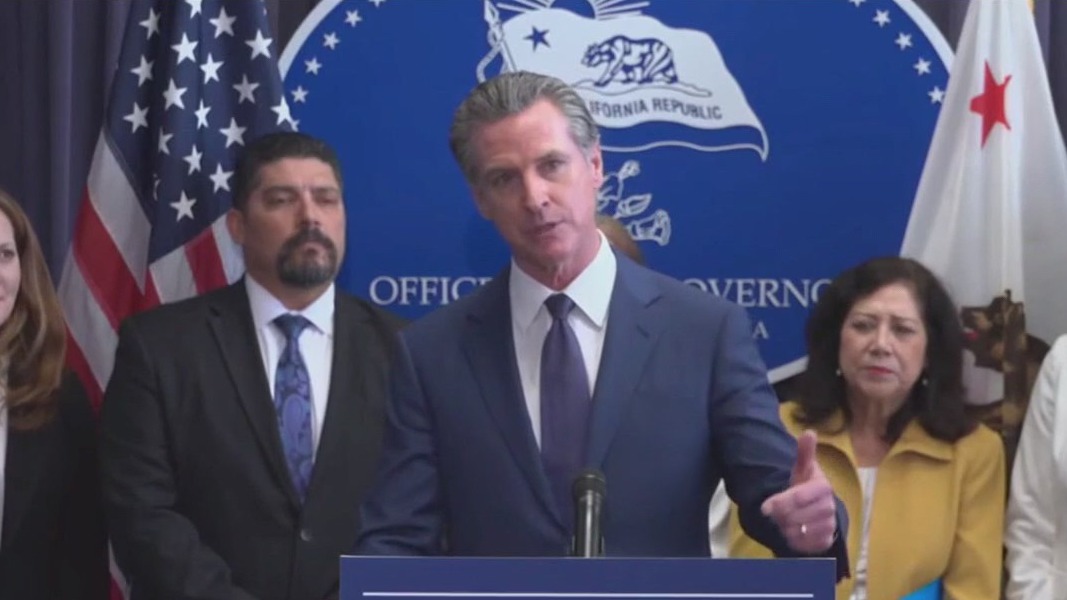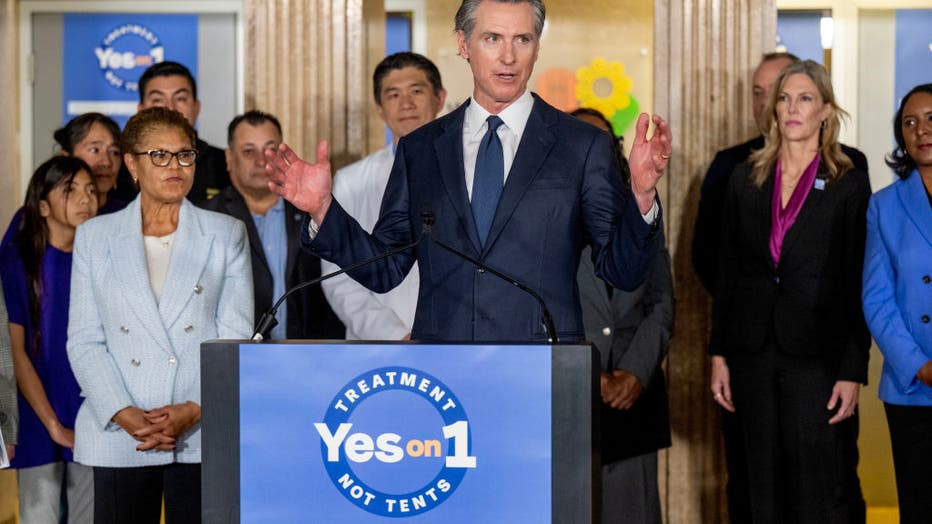California Proposition 1 passes, requiring counties to spend on programs to tackle homelessness

How California's Prop. 1 will play out in counties
California voters have passed a measure that will impose strict requirements on counties to spend on housing and drug treatment programs to tackle the state's homelessness crisis. How will it play out in the counties?
SACRAMENTO, Calif. - California voters have passed a measure that will impose strict requirements on counties to spend on housing and drug treatment programs to tackle the state's homelessness crisis.
Proposition 1 marks the first update to the state's mental health system in 20 years and a win for Democratic Gov. Gavin Newsom, who spent significant time and money campaigning on the measure's behalf, raising more than $13 million to promote it. The measure passed just barely, by 50.2 percent of the vote.
The measure gives the state greater control over a voter-approved tax enacted in 2004 on millionaires for mental health services that gave counties wide latitude in how to spend it.
Counties will now be required to spend a third of the money on housing and programs for homeless people with serious mental illnesses or substance abuse problems.
The initiative also allows the state to borrow $6.38 billion to build 4,350 housing units, half of which will be reserved for veterans, and add 6,800 mental health and addiction treatment beds.
Opponents, including social service providers and county officials, said the change will threaten programs that are not solely focused on housing or drug treatment but keep people from becoming homeless in the first place.
"We're the social safety net. You see counties and their directors of health express concern with this measure," said David Canepa, San Mateo County Board of Supervisors Vice President. "There may not be enough funding for the counties to provide other serivces, because they may have to support these additional services from Prop. 1."
With makeshift tents lining streets and disrupting businesses in communities across the state, homelessness has become one of the most frustrating issues in California and one sure to dog Newsom should he ever mount a national campaign.
Newsom touted the proposition as the final piece in his plan to reform California's mental health system. He has already pushed for laws that make it easier to force people with behavioral health issues into treatment.
Newsom shared a statement over the recent passing of Prop. 1, saying in part: "This is the biggest change in decades in how California tackles homelessness, and a victory for doing things radically different. Proposition 1’s passage means we can begin repairing the damage caused by decades of broken promises and political neglect to those suffering from severe mental illness."
The statement also alluded to some possible conflicts and challenges with local governments.
"Now, counties and local officials must match the ambition of California voters. This historic reform will only succeed if we all kick into action immediately – state government and local leaders, together."
Policy experts point out there is a lot of variability when it comes to exactly what Prop. 1 will include and how soon it will be implemented.
"What we know is the dollar amounts. We know the Governor has promised that this will result in 11,500 new "beds" - a mixture of housing and treatment beds," said Alex Barnard, a sociology professor at New York University who has studied California's mental health system and wrote a book on the state's conservatorship laws and policies, called "Conservatorship: Inside California's System of Coercion and Care for Mental Illness.
"But ‘bed’ doesn't mean very much. A bed could be in a large, locked hospital, or it could be in a small, therapeutic residential program. So there's a huge question about what beds are actually going to turn into," Barnard said.
Barnard said in order for Prop. 1 to be successful, Newsom and state leaders will have to implement plans quickly, with transparency and accountability to the public, especially given the fact that the voters just barely approved the measure.
"I think the state has a limited window to show results. What we're seeing from the voting tallies, is that a lot of Californians are becoming increasingly skeptical we can do anything about the crisis of mental health and homelessness," he said. "In order to fight back against that, the state needs to really show it can use this money effectively."
William Elias, a television producer in Sacramento, said he "was on the fence" about Proposition 1 but decided to vote in favor of it because of the pervasive homelessness problem.
"That's something that's all around us right now," he said. "We got all these tents out here in front of City Hall."
Estrellita Vivirito, a Palm Springs resident, also voted ‘yes' on the measure.
"It's only logical, you know, we have to do something," she said.
Katherine Wolf, a doctoral student at the University of California, Berkeley, said she voted ‘no' on the measure out of concerns it would result in more people being locked up against their will.

Los Angeles, CA - January 03: Governor of California Gavin Newsom speaks during a press conference on Wednesday, January 3, 2023, at the Los Angeles General Medical Center to urge support for Proposition 1 on the March 5, 2024 ballot. The proposition
"I was appalled by the system of laws that he has been building to kind of erode the rights of people with mental disabilities," Wolf said of Newsom.
Griffin Bovee, a Republican state worker in Sacramento, also voted against the proposition and said the state has been wasting taxpayer money.
"Sacramento really shouldn't get another dime until they actually figure out why what they're doing is not working," he said of the state's handling of the homelessness crisis. "They spent $20 billion over the past few years trying to fix that problem and it got worse."
The state accounts for nearly a third of the homeless population in the United States; roughly 181,000 Californians are in need of housing. The state, with a current inventory of 5,500 beds, needs some 8,000 more units to treat mental health and addiction issues.
Revenue from the tax on millionaires, now between $2 billion and $3 billion a year, provides about one-third of the state's total mental health budget.
Opponents, including some county officials, mental health service providers and some Republicans, said the ballot measure would cut funding from cultural centers, peer-support programs and vocational services and would pit those programs against services for homeless people.
They said the single formula also could mean rural counties such as Butte, with a homeless population of fewer than 1,300 people, would be required to divert the same percentage of funds to housing as urban counties such as San Francisco, which has a homeless population six times bigger.
Newsom's administration has already spent at least $22 billion on various programs to address the crisis, including $3.5 billion to convert rundown motels into homeless housing. California is also giving out $2 billion in grants to build more treatment facilities.
KTVU's Allie Rasmus contributed to this report.

